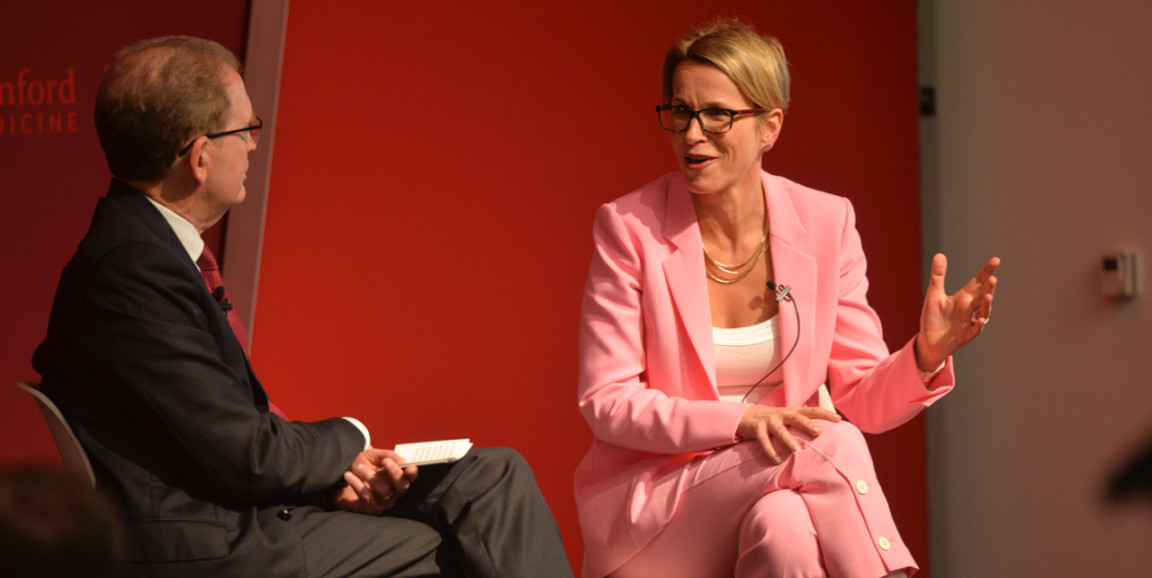When pharmaceutical companies align their research endeavors with academic institutions, they are most likely to translate their findings quickly and safely into beneficial treatments for patients, said Emma Walmsley, CEO of GlaxoSmithKline, at a recent talk on campus as part of the Dean's Lecture Series.
"GSK is an institution that prides itself on the link to academia," she said.
During their lunchtime conversation, which focused on organizational culture, diversity and the importance of partnerships, Dean Lloyd Minor, MD, shared Walmsley's enthusiasm for the collaboration between academia and industry. He explained:
One of the university's long-range plans, called the Innovative Medicines Accelerator, is to look at how we can bridge that gap. And indeed, we have an institute, the ChEM-H institute, that has as its goal bridging that gap. I think there is a lot of room to improve the ecosystem, to do what we do well, which is science and delivered care, and then to partner with pharmaceutical companies that also do what they do really well.
GSK is the largest pharmaceutical company based in the U.K., with more than 100,000 employees globally. Since her promotion to CEO in April 2017, Walmsley said she has worked to focus the organization's three businesses -- pharmaceuticals, vaccines, and consumer health care -- around three long-term priorities: innovation, performance, and trust, each of which can be accelerated by culture change.
The culture of an organization, Walmsley said, is much more than a "fluffy" concept. "It's the way you get stuff done," she said. "It can either be a massive accelerator of results, or a toxic derailer." She added:
The reason people come to work at GSK [is] to impact lives -- we're the biggest vaccine manufacturer in the world, we have leading positions in HIV and respiratory, and we want to build up this new portfolio of immunology-based drugs. So we want to hold on to that purpose and the values of patient-focus, integrity, and respect for each other, but bringing in a whole new level of energy around being a performance-driven organization with more innovative culture, more agility, fearlessness, courage around being okay to fail as long as you get back up again and keep going.
That resilience is especially important, Walmsley said, because the pharmaceutical industry has, by definition, a high rate of trial-and-error.
"We really want to encourage smart risk-taking," she said. She defined smart risk-taking as a both an art and a science -- one that requires a deep understanding of the research and the probability of its success. It means continuing to encourage researchers who make good decisions, even when those good decisions result in a failed attempt. Smart risk-taking is also, she added, an indispensable aspect of an effective workplace culture.
As the first woman to lead a major pharmaceutical company, Walmsley said she is dedicated to increasing diversity and inclusion at her organization, while recognizing that, despite significant progress -- women make up half of GSK's board, 40 percent of its management, and 34 of its executives -- there's still work to be done. She explained:
Diversity of all types is what makes for better, more successful outcome. There's actually quite a lot of research on that. So I think we all have to be accountable and not see it as a competition or 'I win, you lose.' Society wins, our sons and daughters win, and companies and institutions win when we do a better job with all types of diversity...
We still have a lot of progress to make. But I'm an optimist on this topic. If you set targets and are deliberate about it, and measure it, then I think progress can be made."
In the question-and-answer session, audience members expressed their enthusiasm and appreciation for Walmsley's example of a woman in a major corporate leadership position, and also for GSK's role in the progress of medicine.
"On behalf of all of us," said Dean Winslow, MD, professor of medicine, "I want to thank your companies for making all these contributions to human health over the years."
Photo by Rod Searcey




